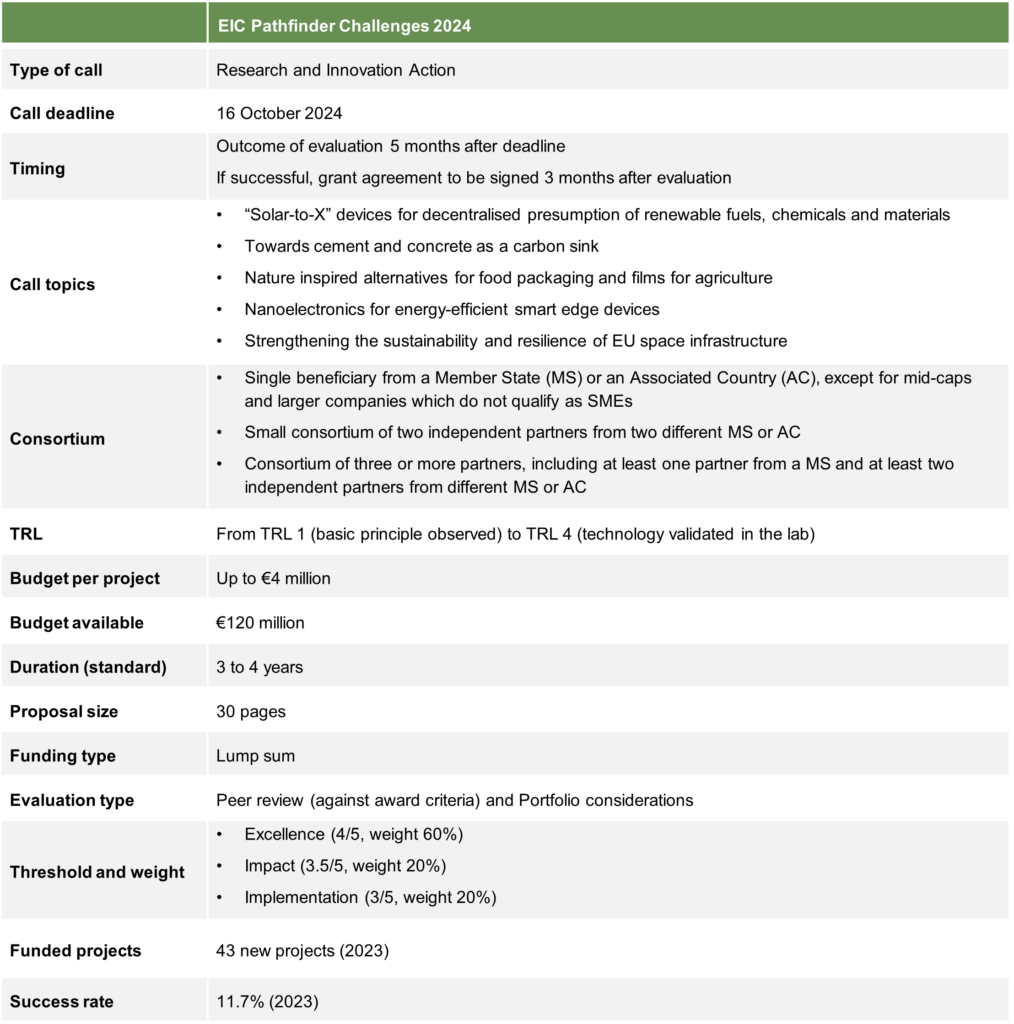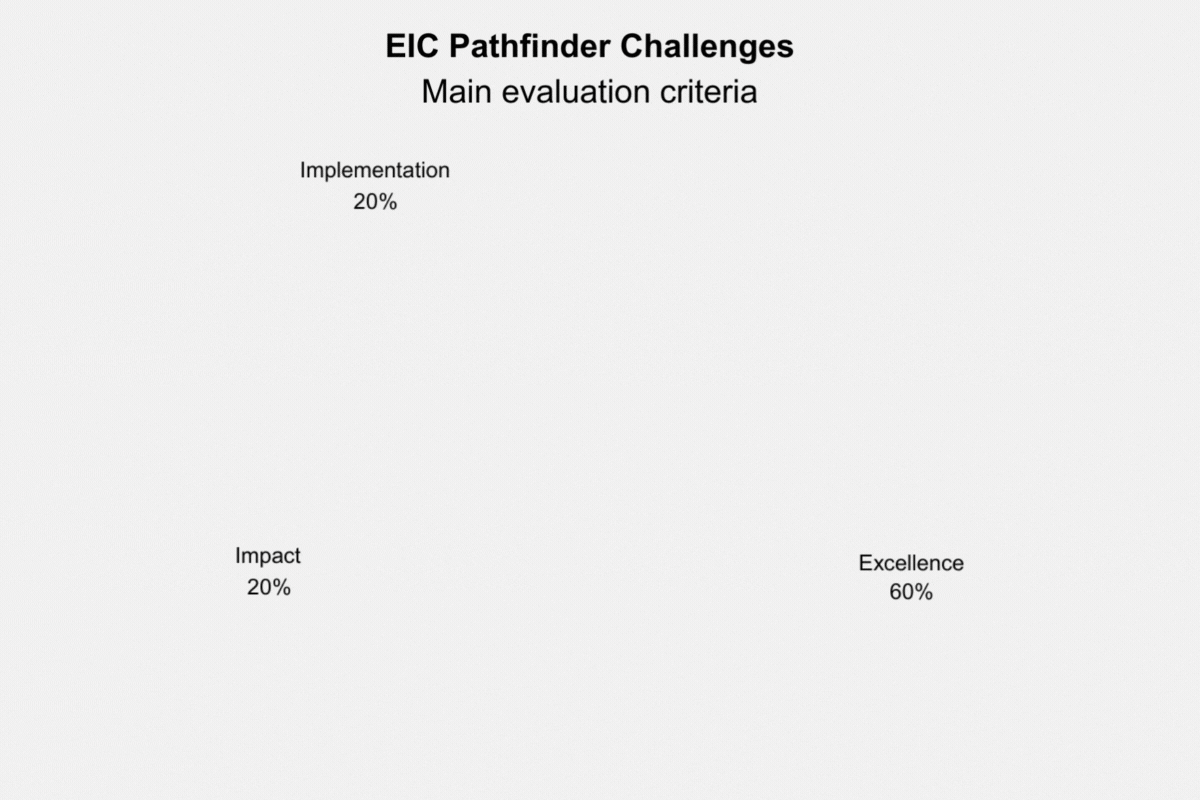EIC Pathfinder Challenges – novelties in this year’s call 2024
4th April 2024 at 3:59 pm
The EIC Pathfinder Challenges call is foreseen to open on 20 June 2024 with the proposal submission deadline on 16 October 2024. This year, 5 new and exciting project topics in the Cleantech and Digital, Industrial & Space areas wait for you.
As one of the key instruments under Horizon Europe, EIC Pathfinder Challenges in 2024 also offers a unique opportunity for researchers and companies to develop novel, innovative and cutting-edge technologies. Just like the Pathfinder Open instrument, the Challenge calls aim to disrupt the current market and create new opportunities to bring technological developments towards commercialization. This funding scheme seeks to support the achievement of distinct project objectives, as predefined by the 5 Challenge topics.
- “Solar-to-X” devices for the decentralized presumption of renewable fuels, chemicals and materials as climate change mitigation pathway.
- Towards cement and concrete as a carbon sink.
- Nature inspired alternatives for food packaging and films for agriculture.
- Nanoelectronics for energy-efficient smart edge devices.
- Strengthening the sustainability and resilience of EU space infrastructure.
For every Challenge, a specific set of project outcomes are defined. The main expected outcomes are high-ranking scientific publications in open access journals and an appropriate protection of Intellectual Property (i.e. patent applications) generated during the project. Challenge specific outcomes are defined per topic. For example, the “Nature inspired alternatives for food packaging and films for agriculture” call envisions project outcomes to provide a portfolio of environmentally safe materials and support the move of the EU towards a circular economy. More details on each Challenge topic are outlined on the EIC Pathfinder Challenges webpage and the EIC Work Programme 2024.
An additional assessment of project-specific aspects, such as regulation, certification and standardisation of results, have been introduced this year. The aim is to help researchers and companies navigate through the regulatory environment and find barriers and opportunities that may strengthen collaborative work between partners and help bring the product or service to the market. The Challenge projects also encourage the empowerment of key actors, such as early-career researchers, SMEs and start-ups, to bring scientific results further and become future leaders in the field. Applicants to the Challenge calls are also encouraged to empower female researchers and to aim for gender balance among work package leaders.
Lump sum budgets and other consideration for your 2024 proposal
The EIC has budgeted up to €120 million for this year’s calls, corresponding to €24 million allocated towards each of the Challenges. The EIC offers up to €4 million budget per project, with a standard duration of 3 to 4 years. This year’s funding will take the form of a lump-sum model, which operates based on the approximation of project costs. Many Horizon Europe instruments are moving towards the lump-sum framework to help streamline the funding process, minimise financial errors and shift the focus of reporting towards technical content while reducing financial administration.
As an applicant, you will be required to fill out an Excel sheet (available on the F&T Portal) with the estimated costs of the project. You will also be required to describe the estimated budget in a detailed budget table per beneficiary and per work package, as a means for justification of the lump sum amount. Given that work packages with a longer duration are recommended to be broken up into shorter work packages to allow for payments based on successful work package completion, ensuring a steady cashflow for project partners, you may need to complete many Excel tables. For example, each beneficiary associated with a work package will be asked to fill out an Excel table.
The final funding amounts will be decided upon during the evaluation process to determine the total lump sum. You are also encouraged to incorporate a work package dedicated to Portfolio activities in your proposal and allocate at least 10 person-months to it. The Portfolio activities explore potential ways to commercialisation of the technologies or services resulting from the Challenge projects (i.e. market competitiveness analysis, technology assessment, etc.). For example, in our PEARL-DNA project, we participate in raising public awareness and standardisation of project results. The success of the proposal often depends on how well the scientific idea can fit the portfolio considerations. Individual portfolio considerations have been laid out for each Challenge call, details of which can be found in the Work Programme 2024.

Back to normal in your 2024 proposal
The proposal layout remains the same as in the previous years. Part A is dedicated to administrative details, call-specific questions and a budget summary, all of which are filled out as online forms. Part B addresses the scientific and technical description of the project and refers you to fulfill the Challenge call objectives.
The page limit of Part B has been set to 30 A4 pages this year. The standard Challenge proposal award criteria are divided into “Excellence”, “Impact” and “Implementation”, with respective threshold and weight of Part B (outlined in the table below). It is important to pay close attention to the specific objectives of each Challenge and address them in relevant sections of your proposal.

As is the standard in all Horizon instruments, the proposals are evaluated against three criteria: Excellence, Impact and Implementation. However, in the EIC Pathfinders, there are weighting factors applied to each criterion: The “Excellence” carries most of the weight (60%) and looks at your approach to address the objectives relevant to the Challenge call. Your idea must portray ambition to bring novelty to the field while remaining realistic in your short- and long-term goals. Additionally, it is important to show the plausibility of your methods to achieve the Challenge objectives. The “Impact” section (20%) addresses the feasibility of the ways you propose to achieve the Challenge objectives and the potential positive impact it could bring to society, economy and the environment. In addition, it is important to demonstrate ways in which you aim to protect results and potential innovations originating from the project. We encourage you to be confident in proposing exploitation measures that will allow the future translation of your results into innovations. The awareness of your project results and its impact should be conveyed through various communication and dissemination activities, to maximise expected outcomes and open opportunities to establish new markets for exploitation of project results. Lastly, the “Implementation” criterion (20%) looks at the strategy of your work plan, addressing the tasks, deliverables, milestones, timelines, and risk identification and mitigation measures to achieve project objectives. The quality of the consortium and the allocation of resources are also assessed here. In addition to the quality of expertise of your consortium members, you must identify the capacity of all consortium members to perform allocated project tasks.
New proposal evaluation process and priorities
The evaluation of your proposal is carried out by at least three external EIC expert evaluators who score it with respect to the award criteria. As a new addition to this year, the evaluators form a consensus group where they agree on a common feedback and score from the proposal assessment. A final consistency check from the EIC expert evaluators and EIC Programme Managers then settles a final feedback and score, which will be sent to you 5 months after the deadline. It is important to add, that as of this year the rebuttal process has been removed.
The projects that successfully meet the thresholds defined in the award criteria are then considered for the Challenge(s) Portfolio. In this step, your proposal is mapped into different categories stemming from the objectives of the respective Challenge. A suitable portfolio will then be selected to fund a coherent set of proposals aimed at achieving expected outcomes and strengthening the impactive of the Challenges call topics. You can expect some minor adjustments to be added to your proposal by the evaluation committee at this stage.
What follows the evaluation
You will be informed about the results of the evaluation approximately 5 months after the proposal deadline. You can expect to receive an Evaluation Summary Report detailing the final score and comments from the evaluation committee members. All proposals, either retained for funding or not successful this year, will be informed about the underlying portfolio activities. A detailed lump sum budget table will also be provided in the Evaluation Summary report to all applicants of proposals invited to sign the Grant Agreement, placed in a reserve list or reject. This is to allow everyone an equal and fair overview of their proposal highlights and downfalls. In case of success, you will be contacted and supported by the Project Officer and an allocated EIC Programme Manager to assist in the preparation of the Grant Agreement. The planning of Portfolio activities will follow, along with the preliminary preparation of the Challenges roadmap to define collective deliverables, activities and objectives of the portfolio of projects.
Support for your Pathfinder Challenges proposal preparation
Over the years, we at accelopment have successfully supported many EIC Pathfinder projects, including PEARL-DNA (Pathfinder Challenge) and three recently started and ongoing Pathfinder Open (POLINA, PIONEAR and CORENET). Our role is to provide support and guidance with the proposal preparation process, and we would be happy to hear about your project ideas, consortium, and proposal plans. Have a look at our Proposal Writing services and contact our EIC Pathfinder experts to discuss how we can best support you with your innovative visions and ambitions. We look forward to hearing from you and to discover how we can enhance your applications chances of success. Follow our EIC blog series to find out more about the Challenge calls to find the one that best suits you.

Andreia Cruz
Research & Innovation Project Manager

Dr. Anna Ziemele
Research & Innovation Project Associate
